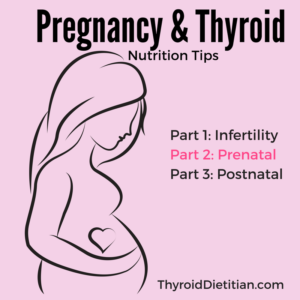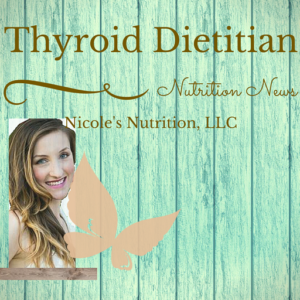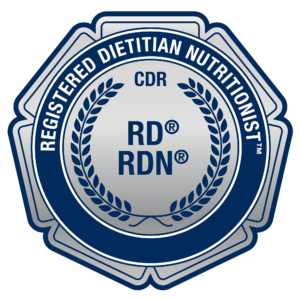
Part 2: Thyroid Prenatal Nutrition and Health
My previous post addressed the pre-conception time period, and this post is dedicated to all things pregnancy! Here are thoughts on thyroid health during pregnancy, and if there is anything special to be done for nutrition during pregnancy.
*This post is not a substitute for medical advice.*
Basic Nutrition
Anyone with a thyroid condition should follow all of the standard guidelines for pregnancy nutrition:
- Limit seafood that is high in mercury like white tuna, mackerel, etc (I completely avoided because I am a little paranoid about mercury… I know). Max serving is 6 oz per week, but I prefer less.
- 2 servings of the lowest mercury seafood per week is recommended (or, can consider DHA/EPA supplement which is what I took along with eating some wild salmon)
- Limit caffeine (approx max of 200 mg per day)
- Avoid unpasteurized foods as they are risks for foodborne illness
- Avoid deli meats unless heated above 150 degrees F.
- Monitor foods that contain Listeria by checking this website so you know what to look for and avoid. Frozen vegetables and packaged lettuce made the list last year!
- Eat no raw fish or meat
- Take a 400 mg folate supplement that is well absorbed aka methylfolate (NatureFolate is brand name, 5-MTHF, or methyltetrahydrofolate). I took Prenatal Pro multi that includes the right type of folate.

Special Prenatal Nutrition Considerations for Hashimoto’s
- Ditch gluten if you have Hashimoto’s or Grave’s and have not done so already. Read all about gluten and Hashimoto’s here.
- Iron: Monitor iron (ferritin levels not just hemoglobin/hematocrit) throughout pregnancy. I recommend testing each trimester. Those with Hashimoto’s and hypothyroidism tend to run lower on iron. You may need an additional absorbable iron supplement. I used an iron bisglycinate supplement occaisonally. In addition, make sure to consume plenty of iron-rich foods such as organic red meats (if you eat meat), cooked leafy greens (especially organic spinach), some dried fruit (but, do not go overboard due to sugar), peas/pea products, sardines, poultry, sprouted seeds, sprouted beans, potato, and nuts.
- Vitamin D: Needs are higher during pregnancy. Have your vitamin D tested during the first trimester, and supplement accordingly. If you take a higher amount of vitamin D, I recommend magnesium and vitamin K2 to balance out that vitamin D. Why vitamin D? It tends to run low in those with autoimmune conditions like Hashimoto’s. Optimal levels (50 -70) support the immune system. Lastly, the growing baby can deplete mama of vitamin D. Optimal vitamin D is also needed down the road for healthy breastmilk. Overall, this is mostly to make sure your body does not get depleted of an essential vitamin.
- Calcium: Needs are also higher during pregnancy to help build healthy bones in baby. Calcium is often forgotten for those avoiding dairy and those with Hashimoto’s. Basically, I am saying, “don’t forget your calcium!” even if you do not consume dairy. I got a small supplement in my prenatal multi, but also consumed salmon, cooked leafy greens, white beans, and dried figs. Other non-dairy sources of calcium: almonds, oranges, cooked kale, molasses, and sardines.
- Iodine is controversial for those with Hashimoto’s. Some experts say iodine restriction can improve the autoimmune condition, while others recommend supplementation. This is a tricky guideline for pregnancy since the growing baby needs iodine for proper development. I would never recommend iodine restriction during pregnancy. Here is what I did:
I went ahead took iodine (200 mcg) that was included in my prenatal multi, and this seems like it was a good option. 200 mcg seemed to be a good amount for me (not excessive and not too low). I never experienced any symptoms from taking the iodine.
Lab Testing is Key!
In addition to nutrition guidelines, you will also want to get a full thyroid panel each trimester. This means to make sure you get your free T4 and free T3 tested at each visit. Make sure to get a full thyroid panel done as soon as you find out you are pregnant. This can help to avoid miscarriage (by making sure you levels are in range). Get your progesterone checked at this time as well as your vitamin D and ferritin.
My Experience
My thyroid levels were really wacky the first trimester, and then looked pretty darn perfect (the best I had ever seen) during the second and third trimester. Antibody levels also dropped to the lowest I had ever seen during my pregnancy. My immune system must have shifted for the better. I was concerned about not having enough T4 in the first trimester since I was taking Nature-Throid (a T4 and T3 combination medicine), but my provider reassured me my labs were ok. Most practitioners DO NOT recommend natural dessicated thyroid medicines (the ones containing T3) during pregnancy since the baby needs much more T4. Baby does not produce their own thyroid hormone until approximately 10 weeks gestation, and relies on Mom’s thyroid hormone before then. So, I was nervous continuing to take my Nature-Throid. But, I knew if that is how my body got pregnant, I should continue to take the medicine that made it happen.
Another key is to find a provider that thoroughly understands T4 and T3 hormones.
Feel free to posts questions below! I will leave you with this fun and healthy pregnancy drink:








For graves, what prenatal vitamins do you recommend?
I like the Designs for Health Prenatal Pro, but as always, check with your doctor before beginning any new supplements.
Thank you! Do these have DHA? I can’t see if the label…if not, did you take another supplement with DHA? Thanks again for the help
Thank you! Do these have DHA? I can’t see if the label…if not, did you take another supplement with DHA? Thanks again for the help